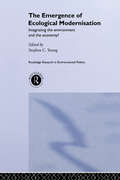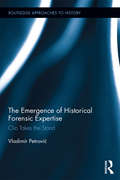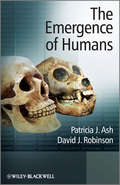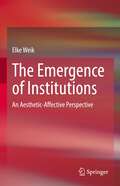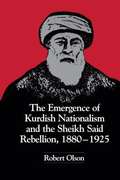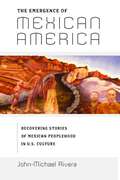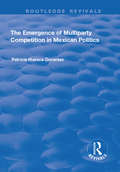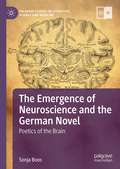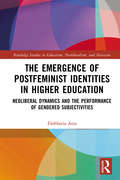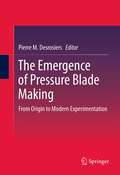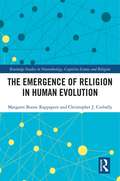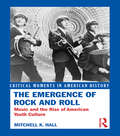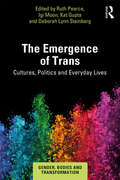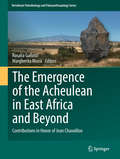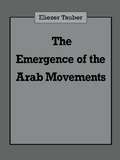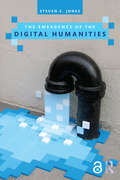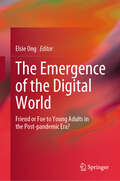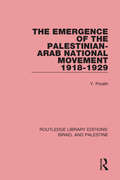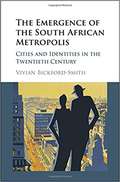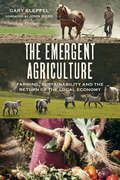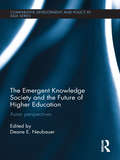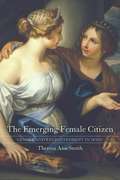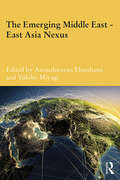- Table View
- List View
The Emergence of Ecological Modernisation: Integrating the Environment and the Economy? (Environmental Politics #1)
by Stephen C. YoungThe Emergence of Ecological Modernisation offers a wealth of empirical research material from an international perspective, bringing together previously scattered sources for the first time. It addresses a series of theoretical issues that are of key contemporary relevance, such as the relationship between ecological modernisation and sustainable development; strategies for promoting ecological modernisation, and the extent to which it is possible to 'green' contemporary capitalism.
The Emergence of Historical Forensic Expertise: Clio Takes the Stand (Routledge Approaches to History)
by Vladimir PetrovićThis book scrutinizes the emergence of historians participating as expert witnesses in historical forensic contribution in some of the most important national and international legal ventures of the last century. It aims to advance the debate from discussions on whether historians should testify or not toward nuanced understanding of the history of the practice and making the best out of its performance in the future.
The Emergence of Humans
by David J. Robinson Patricia J. AshThe Emergence of Humans is an accessible, informative introduction to the scientific study of human evolution. It takes the reader through time following the emergence of the modern human species Homo sapiens from primate roots. Acknowledging the controversy surrounding the interpretation of the fossil record, the authors present a balanced approach in an effort to do justice to different views.Each chapter covers a significant time period of evolutionary history and includes relevant techniques from other disciplines that have applications to the field of human evolution. Self-assessment questions linked to learning outcomes are provided for each chapter, together with further reading and reference to key sources in the primary literature. The book will thus be effective both as a conventional textbook and for independent study.Written by two authors with a wealth of teaching experience The Emergence of Humans will prove invaluable to students in the biological and natural sciences needing a clear, balanced introduction to the study of human evolution.
The Emergence of Institutions: An Aesthetic-Affective Perspective
by Elke WeikThis book presents an experiential, aesthetic-affective approach to the study of institutions. Drawing on institutional sociology, hermeneutics, phenomenology and process philosophy, it conceptualises institutions as collective experiences with their own self-promoting and self-propelling powers. Instead of seeing institutional emergence, change and decline as the result of actors’ interests and manipulations, this book re-establishes the importance of factors beyond human design and intervention. Drawing on process theory, it shows how ideas, norms and values can form self-stabilising configurations that affect people without conscious realisation. It complements current thinking about institutions by showing how institutions constitute people long before people constitute them. With the help of authors as diverse as Antonio Damasio, A.N. Whitehead, J.W. von Goethe and Max Weber, Elke Weik crafts a perspective that allows us to understand institutions as aesthetic and affective powers in their own right. This book is for researchers interested in process theory, institutional and organisational studies, hermeneutics, and aesthetics.
The Emergence of Kurdish Nationalism and the Sheikh Said Rebellion, 1880-1925
by Robert OlsonThis is the first work in any Western language dealing with the development of Kurdish nationalism during this period and is supported with documentation not previously utilized, principally from the Public Record Office in Great Britain. In addition, the author provides much new material on Turkish, Armenian, Iranian, and Arab history and new insights into Turkish-Armenian relations during the most crucial era of the history of these two peoples.
The Emergence of Mexican America: Recovering Stories of Mexican Peoplehood in U.S. Culture (Critical America #36)
by John-Michael RiveraWinner of the 2006 Thomas J. Lyon Book Award in Western American Literary Studies, presented by the Western Literature AssociationIn The Emergence of Mexican America, John-Michael Rivera examines the cultural, political, and legal representations of Mexican Americans and the development of US capitalism and nationhood. Beginning with the Mexican-American War of 1846-1848 and continuing through the period of mass repatriation of US Mexican laborers in 1939, Rivera examines both Mexican-American and Anglo-American cultural production in order to tease out the complexities of the so-called “Mexican question.” Using historical and archival materials, Rivera's wide-ranging objects of inquiry include fiction, non-fiction, essays, treaties, legal materials, political speeches, magazines, articles, cartoons, and advertisements created by both Mexicans and Anglo Americans. Engaging and methodologically venturesome, Rivera's study is a crucial contribution to Chicano/Latino Studies and fields of cultural studies, history, government, anthropology, and literary studies.
The Emergence of Multiparty Competition in Mexican Politics (Routledge Revivals Ser.)
by Patricia Huesca-DorantesThis title was first published in 2003. Mexico's presidential election in 2000 marked the end of 71 years of one-party rule, after a slow process of emergence of democratic institutions and viable second-party candidates. Yet the process of democratization has been uneven, proceeding much more rapidly in some regions than in others. This book examines whether diffusion processes have been at work or whether broader national processes of change have unfolded across an uneven socio-economic map. Using new methods of spatial econometrics, it explores how multi-party politics have emerged in a single country, testing both spatial diffusion and political development theories. Mexico makes an interesting study - with its contrasting borders, different kinds of geography, and levels of industrialisation and development, it involves a wide range of variables as well as socio-economic aspects of the population that display sharp regional differentiation.
The Emergence of Neuroscience and the German Novel: Poetics of the Brain (Palgrave Studies in Literature, Science and Medicine)
by Sonja BoosThe Emergence of Neuroscience and the German Novel: Poetics of the Brain revises the dominant narrative about the distinctive psychological inwardness and introspective depth of the German novel by reinterpreting the novel’s development from the perspective of the nascent discipline of neuroscience, the emergence of which is coterminous with the rise of the novel form. In particular, it asks how the novel’s formal properties—stylistic, narrative, rhetorical, and figurative—correlate with the formation of a neuroscientific discourse, and how the former may have assisted, disrupted, and/or intensified the medical articulation of neurological concepts. This study poses the question: how does this rapidly evolving field emerge in the context of nineteenth century cultural practices and what were the conditions for its emergence in the German-speaking world specifically? Where did neuroscience begin and how did it broaden in scope? And most crucially, to what degree does it owe its existence to literature?
The Emergence of Postfeminist Identities in Higher Education: Neoliberal Dynamics and the Performance of Gendered Subjectivities (Routledge Studies in Education, Neoliberalism, and Marxism)
by Eleftheria AttaBy drawing on qualitative research conducted in universities in Cyprus, this book presents an account of life in the academy from a feminist perspective. In doing so, the texts uncover new gendered identities emerging as a result of neoliberal and postfeminist discourses in Higher Education. Adopting a psychosocial lens, and drawing on theories of affect and performativity, this volume explains academics’ responses to growing levels of stress, anxiety, precarity and competition in their professional environment. Chapters offer rich observation of how academic staff and faculty negotiate aspects of femininity and masculinity within the academy, and so highlights the performance of ‘gendered academic subjectivities’ as a way in which academics deal with increasing pressures and anxiety. Ultimately proposing a typography of emergent, affective identities including industry academics, fossilised, family and wannabe academics, the volume yields important insights into the current workings of Higher Education and shows the personal and professional impacts of neoliberal dynamics. This volume will prove to be a useful resource for researchers and high-level scholars in the fields of education, sociology of education and gender studies. More generally, scholars and academics with an interest in the changing face of contemporary Higher Education will find this book informative.
The Emergence of Pressure Blade Making
by Pierre M. DesrosiersHuman development is a long and steady process that began with stone tool making. Because of this skill, humans were able to adapt to climate changes, discover new territories, and invent new technologies. "Pressure knapping" is the common term for one method of creating stone tools, where a larger device or blade specifically made for this purpose is use to press out the stone tool. Pressure knapping was invented in different locations and at different points in time, representing the adoption of the Neolithic way of life in the Old world. Recent research on pressure knapping has led for the first time to a global thesis on this technique. The contributors to this seminal work combine research findings on pressure knapping from different cultures around the globe to develope a cohesive theory. This contributions to this volume represents a significant development to research on pressure knapping, as well as the field of lithic studies in general. This work will be an important reference for anyone studying the Paleolithic, Mesolithic, and Neolithic periods, lithic studies, technologies, and more generally, cultural transmission.
The Emergence of Religion in Human Evolution (Routledge Studies in Neurotheology, Cognitive Science and Religion)
by Christopher J. Corbally Margaret Boone RappaportReligious capacity is a highly elaborate, neurocognitive human trait that has a solid evolutionary foundation. This book uses a multidisciplinary approach to describe millions of years of biological innovations that eventually give rise to the modern trait and its varied expression in humanity’s many religions. The authors present a scientific model and a central thesis that the brain organs, networks, and capacities that allowed humans to survive physically also gave our species the ability to create theologies, find sustenance in religious practice, and use religion to support the social group. Yet, the trait of religious capacity remains non-obligatory, like reading and mathematics. The individual can choose not to use it. The approach relies on research findings in nine disciplines, including the work of countless neuroscientists, paleoneurologists, archaeologists, cognitive scientists, and psychologists. This is a cutting-edge examination of the evolutionary origins of humanity’s interaction with the supernatural. It will be of keen interest to academics working in Religious Studies, Neuroscience, Cognitive Science, Anthropology, Evolutionary Biology, and Psychology.
The Emergence of Rock and Roll: Music and the Rise of American Youth Culture (Critical Moments in American History)
by Mitchell K. HallRock and roll music evolved in the United States during the late 1940s and 1950s, as a combination of African American blues, country, pop, and gospel music produced a new musical genre. Even as it captured the ears of the nation, rock and roll was the subject of controversy and contention. The music intertwined with the social, political, and economic changes reshaping America and contributed to the rise of the youth culture that remains a potent cultural force today. A comprehensive understanding of post-World War II U.S. history would be incomplete without a basic knowledge of this cultural phenomenon and its widespread impact. In this short book, bolstered by primary source documents, Mitchell K. Hall explores the change in musical style represented by rock and roll, changes in technology and business practices, regional and racial implications of this new music, and the global influences of the music. The Emergence of Rock and Roll explains the huge influence that one cultural moment can have in the history of a nation.
The Emergence of Trans: Cultures, Politics and Everyday Lives (Gender, Bodies and Transformation)
This book represents the vanguard of new work in the rapidly growing arena of Trans Studies. Thematically organised, it brings together studies from an international, cross-disciplinary range of contributors to address a range of questions pertinent to the emergence of trans lives and discourses. Examining the ways in which the emergence of trans challenges, develops and extends understandings of gender and reconfigures everyday lives, it asks how trans lives and discourses articulate and contest with issues of rights, education and popular common-sense. With attention to the question of how trans has shaped and been shaped by new modes of social action and networking, The Emergence of Trans also explores what the proliferation of trans representation across multiple media forms and public discourse suggests about the wider cultural moment, and considers the challenges presented for health care, social policy, gender and sexuality theory, and everyday articulations of identity. As such, it will appeal to scholars and students of gender and sexuality studies, as well as activists, professionals and individuals interested in trans lives and discourses.
The Emergence of the Acheulean in East Africa and Beyond (Vertebrate Paleobiology And Paleoanthropology Ser.)
by Rosalia Gallotti Margherita MussiThis edited volume presents current archaeological research and data from the major early Acheulean sites in East Africa, and addresses three main areas of focus; 1) the tempo and mode of technological changes that led to the emergence of the Acheulean in East Africa; 2) new approaches to lithic collections, including lithic technology analyses; and 3) the debated coexistence of the Developed Oldowan and the early Acheulean. The chapters are the proceedings from the workshop titled “The Emergence of the Acheulean in East Africa”, held at University of Rome “La Sapienza” on September 12–13, 2013. The aim of the workshop was to bring together researchers currently working in this field in East Africa, in order to define the characteristics and the evolution of the early Acheulean. The volume was expanded with some chapters on the preceding Oldowan, on the African fauna and on paleovegetation, on the Acheulean in Asia and, eventually, on the Acheulean in Europe. The book is addressed to the scientific community, and will be of interest to researchers, graduate students, archaeologists, paleontologists, and paleoanthropologists. This volume is dedicated to the memory of Jean Chavaillon (March 25, 1925 - December 21, 2013), the leading archaeologist and Quaternary geologist who researched with unfailing enthusiasm the earliest human cultures and directed from 1965 to 1995 the French Archaeological Mission at Melka Kunture.
The Emergence of the Arab Movements
by Eliezer TauberPublished in the year 1993, The Emergence of the Arab Movements is a valuable contribution to the field of Middle Eastern Studies.
The Emergence of the Digital Humanities (Open Access)
by Steven E. JonesThe past decade has seen a profound shift in our collective understanding of the digital network. What was once understood to be a transcendent virtual reality is now experienced as a ubiquitous grid of data that we move through and interact with every day, raising new questions about the social, locative, embodied, and object-oriented nature of our experience in the networked world. In The Emergence of the Digital Humanities, Steven E. Jones examines this shift in our relationship to digital technology and the ways that it has affected humanities scholarship and the academy more broadly. Based on the premise that the network is now everywhere rather than merely "out there," Jones links together seemingly disparate cultural events—the essential features of popular social media, the rise of motion-control gaming and mobile platforms, the controversy over the "gamification" of everyday life, the spatial turn, fabrication and 3D printing, and electronic publishing—and argues that cultural responses to changes in technology provide an essential context for understanding the emergence of the digital humanities as a new field of study in this millennium. The Open Access version of this book, available at https://doi.org/10.4324/9780203093085, has been made available under a Creative Commons Attribution-Non Commercial-No Derivatives 4.0 license.
The Emergence of the Digital World: Friend or Foe to Young Adults in the Post-pandemic Era?
by Elsie OngThis book specifically focuses on young adults who have the highest usage of digital technologies in their daily lives. We have assembled contributions of knowledge from scholars and students in Higher Education as they have the most direct experience of going through COVID and were most impacted by it. Through the collection of these views and studies, we will critically discuss how digital technological advances the unique experiences of young adults going through the pandemic. The content will cover a wide range of learning, policy-making, and mental health outcomes to raise pragmatic value to those appraising, and restructuring programs for individuals engaging in digital technologies. This book will draw conclusions on important clinical impact and scientific value on what might be the new direction for upcoming digital intervention and the trend of newly designed educational program for Higher Education. Readers will gain knowledge on the significant impact upon research and improvements for this young generation.
The Emergence of the Palestinian-Arab National Movement, 1918-1929 (RLE Israel and Palestine)
by Yehoshua PorathThe resurgence of Palestinian nationalism in the wake of the 1967 Arab-Israeli war tended to overshadow the fact that Palestinian national consciousness is not a new phenomenon, but traces its origins back to the time when the first stirrings of nationalism were being felt in many parts of the under-developed world. This work, first published in 1974, is based on both Arabic and Hebrew primary sources as well as English and French official and unofficial documents, and was the first detailed study of the infancy period of Palestinian nationalism. The book begins by establishing the position of Palestine and Jerusalem in Islamic history and their significance within the concepts of Islam, and outlines the social and political features of the Palestinian population at the beginning of the First World War. The author then charts in detail the development of Palestinian nationalism over the decade after the War. Two major forces influenced this development and reacted with it: Zionism, with its ambitious schemes for settling Jews in Palestine and creating a National Home for them there, and Arab nationalism on a wider scale, which was emerging spontaneously with the disintegration of the Ottoman Empire and the spreading of ideas of self-determination. The growing threat posed by Zionism awoke the Palestinian population to the need for organization and the establishment of their own identity to oppose it, while the focus of their national aspirations widened or narrowed according to the ability which they felt at any given time to confront Zionism and achieve self-expression within a Palestinian rather than an all-Syrian national framework. The events of these turbulent years – the confrontations with the British, delegations, boycotts, proposals and rejections, the emergence of al-Hajj Amin al-Husayni, the Wailing Wall conflict and its repercussions – are all described within the context of these wider considerations, which also include Britain’s own role as holder of the Mandate over Palestine.
The Emergence of the South African Metropolis
by Vivian Bickford-SmithFocusing on South Africa's three main cities - Johannesburg, Cape Town, and Durban - this book explores South African urban history from the late nineteenth century onwards. In particular, it examines the metropolitan perceptions and experiences of both black and white South Africans, as well as those of visitors, especially visitors from Britain and North America. Drawing on a rich array of city histories, travel writing, novels, films, newspapers, radio and television programs, and oral histories, Vivian Bickford-Smith focuses on the consequences of the depictions of the South African metropolis and the 'slums' they contained, and especially on how senses of urban belonging and geography helped create and reinforce South African ethnicities and nationalisms. This ambitious and pioneering account, spanning more than a century, will be welcomed by scholars and students of African history, urban history, and historical geography.
The Emergency Diaries: Stories from Doctors Inside the ER
by Northwell's Staten Island University HospitalHarrowing and hopeful tales from doctors inside the emergency room at Staten Island University Hospital—one of the flagship hospitals of Northwell Health, New York&’s largest health care provider Open 24 hours a day, 365 days a year—through winter storms, hurricanes, and global pandemics—emergency rooms are vital to the safety of any community. Day in and day out, thousands of patients pass through their doors to address their immediate medical needs. From life-threatening illnesses to minor ailments, ER doctors and nurses are the first line of defense when something goes wrong with our bodies. Written as a series of essays and stories by real ER doctors, The Emergency Diaries gives readers a glimpse into the hearts and minds of medicine&’s finest, and the seemingly insurmountable challenges these everyday heroes face. Doctors recount firsthand the challenging nature of their profession and share pivotal moments in their medical careers that have stuck with them to this day. Whether it&’s delivering the bad news or making split-second decisions to save lives, the extremes of this profession can be overwhelming. ER doctors and nurses are under incredible pressure to act with grace, precision, and mental fortitude when caring for their patients. Larger national events—like the opioid epidemic, natural disasters, and the coronavirus pandemic—have only exacerbated this stress in recent years. This poignant-yet-hopeful book tells their stories and serves as a testament to their incredible resilience and sacrifice for the greater good.
The Emergency: A Year of Healing and Heartbreak in a Chicago ER
by Thomas FisherThe riveting, pulse-pounding story of a year in the life of an emergency room doctor trying to steer his patients and colleagues through a crushing pandemic and a violent summer, amidst a healthcare system that seems determined to leave them behind ONE OF NEWSWEEK&’S MOST ANTICIPATED BOOKS OF 2022As an emergency room doctor working on the rapid evaluation unit, Dr. Thomas Fisher has about three minutes to spend with the patients who come into the South Side of Chicago ward where he works before directing them to the next stage of their care. Bleeding: three minutes. Untreated wound that becomes life-threatening: three minutes. Kidney failure: three minutes. He examines his patients inside and out, touches their bodies, comforts and consoles them, and holds their hands on what is often the worst day of their lives. Like them, he grew up on the South Side; this is his community and he grinds day in and day out to heal them. Through twenty years of clinical practice, time as a White House fellow, and work as a healthcare entrepreneur, Dr. Fisher has seen firsthand how our country&’s healthcare system can reflect the worst of society: treating the poor as expendable in order to provide top-notch care to a few. In The Emergency, Fisher brings us through his shift, as he works with limited time and resources to treat incoming patients. And when he goes home, he remains haunted by what he sees throughout his day. The brutal wait times, the disconnect between hospital executives and policymakers and the people they're supposed to serve, and the inaccessible solutions that could help his patients. To cope with the relentless onslaught exacerbated by the pandemic, Fisher begins writing letters to patients and colleagues—letters he will never send—explaining it all to them as best he can. As fast-paced as an ER shift, The Emergency has all the elements that make doctors&’ stories so compelling—the high stakes, the fascinating science and practice of medicine, the deep and fraught interactions between patients and doctors, the persistent contemplation of mortality. And, with the rare dual perspective of somebody who also has his hands deep in policy work, Fisher connects these human stories to the sometimes-cruel machinery of care. Beautifully written, vulnerable and deeply empathetic, The Emergency is a call for reform that offers a fresh vision of health care as a foundation of social justice.
The Emergent Agriculture
by Gary Kleppel John IkerdLong embraced by corporations who are driven only by the desire for profit, industrial agriculture wastes precious resources and spews millions of tons of greenhouse gases into the atmosphere each year, exacerbating climate change and threatening the very earth and water on which we depend. However, this dominant system, from which Americans obtain most of their food, is being slowly supplanted by a new paradigm.The Emergent Agriculture is a collection of fourteen thematic essays on sustainability viewed through the lens of farming. Arguing that industrial food production is incompatible with the realities of nature, science, and ethics, this lyrical narrative makes the case for a locally based food system which is: Stable in the face of economic uncertainty Resilient in the face of environmental variability Grounded in stewardship of the land, on attaching value to food and the craft involved in producing it, and on respecting the dignity of farmers, consumer,s and livestockA revolution in food production is underway. Written from the vantage point of an ecologist who is also a farmer, The Emergent Agriculture is essential reading for anyone interested in food security and the potential for growing local economies. Food for thought about the future of food.Gary Kleppel is a professor of biology at the SUNY Albany, where he focuses on sustainable agriculture, conservation-based grazing, and the ecology of human-dominated landscapes. He and his wife Pam are owners of Longfield Farm, where they produce grass-fed lamb, wool, free range chickens and eggs, and artisanal breads.
The Emergent Knowledge Society and the Future of Higher Education: Asian Perspectives (Comparative Development and Policy in Asia)
by Deane E. NeubauerThe nature of higher education is by no means fixed: it has evolved over time; different models of higher education co-exist alongside each other at present; and, worldwide, there are demands for higher education to change to better help support economic growth and to better fit chagning social and economic circumstances. This book examines, from an Asian perspective, the debates about how higher education should change. It considers questions of funding, and of who will attend universities, and the fundamental question of what universities are for, especially as the three key funcations of universities - knowledge creation through research, knowledge dissemination through teaching and service, and knowledge conservation through libraries, the disciplinary structuring of knowledge and in other ways - are increasingly being carried out much more widely outside universities in the new "knowledge society". Throughout, the book discusses the extent to which the countries of East Asia are developing new models of higher education, thereby better preparing themselves for the "new "knowledge society", rather than simply following old Western models.
The Emerging Female Citizen: Gender and Enlightenment in Spain
by Theresa Ann SmithAn important study of women and their roles in society during the 18th-century Spanish Enlightenment.
The Emerging Middle East-East Asia Nexus (Durham Modern Middle East and Islamic World Series)
by Anoushiravan Ehteshami Yukiko MiyagiAs the economies of East Asia grow ever stronger, their need for energy resources increases, which in turn compels closer relations with the countries of the Middle East. This book examines the developing relations between the countries of East Asia, especially China and Japan, with the countries of the Middle East. It looks at various key bilateral relationships, including with Iran and Syria, discusses the impact on the United States’ hegemony in both regions, considers whether the new relations represent a contribution to, or a threat to, peace and stability, and assesses the implications of the changes for patterns of regional and global international relations systems.
